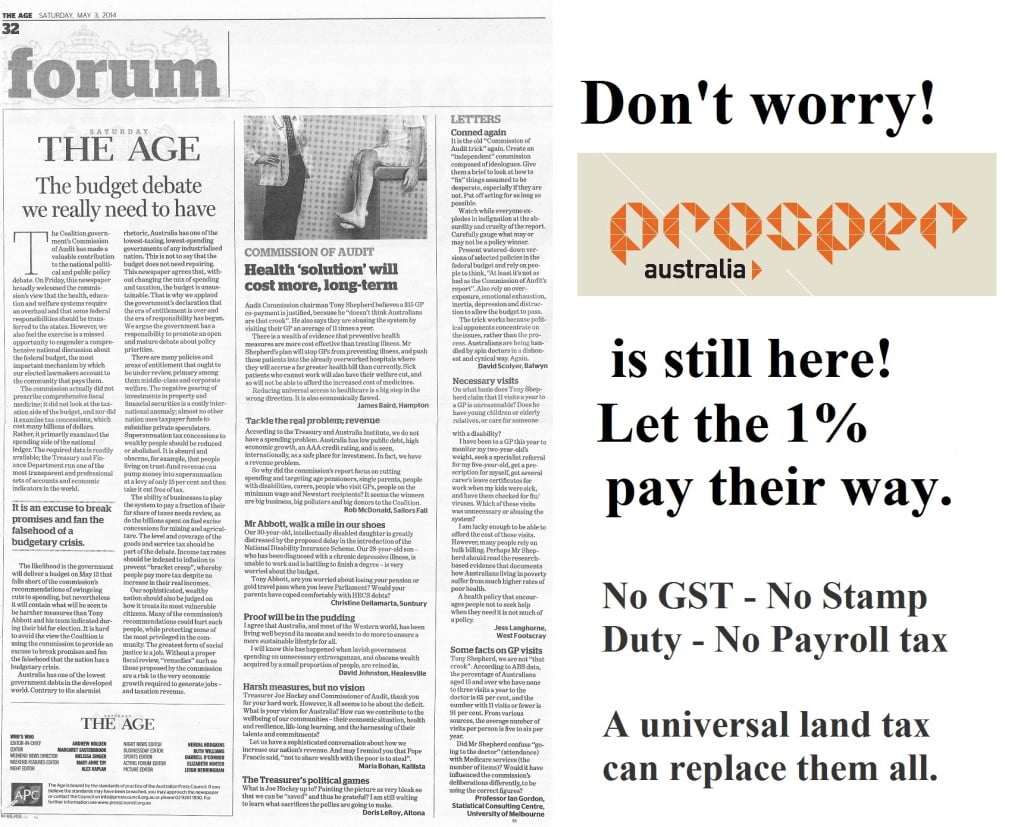Well, the 2014 budget was indeed tough: everyone including pensioners to pay $7.00 to the doctor, on top of Medibank contributions; petrol will cost more, etc., etc. …. but that’s not the worst of it.
For me, the outstanding feature is the clearly inadequate level of state funding for education and health. I actually agree with you, Treasurer Joe Hockey, that the states should be more responsible for their own funding ; so should local governments for that matter. Why do municipalities and states believe they have a right to keep putting their hands out to the federal government for funding when they have their own revenue bases? This was not the way federalism was designed.
But, Joe, I can’t help think this is your big play to make the states get together to request an increase in the GST from the federal government, as is necessary if the GST is to be increased beyond the existing level of 10%.
You’ve prepared the ground well. You’ve had the Grattan Institute and desultory neoclassical economists pave the way, promoting extension of the GST as the only “reasonable” way to go to get out of this one: to such an extent that the very people who would be pilloried most by such an increase are now actually advocating that this should happen! Nice, but absolutely misbegotten!
And that’s most likely what will happen.
Joe, you know that business ends up not paying GST, so it’s only consumers who’ll pay more, and those who earn less and spend what they earn will pay proportionally more GST out of their income. So, where’s the equity, because the GST is regressive? And, of course, the Grattan Institute has been funded by a couple of the big four banks who don’t have to pay GST – or increases or extensions to the GST. How good’s that!
There’s another fairer option, Joe. One we rarely hear about. Can you explain why?
You know full well the states run land taxes, Joe, and they’ve badly mismanaged them, with all their thresholds, exemptions, multiple rates and aggregation provisions. Why not take over their land taxing powers, as you did their sales taxes, apply a single rate in the dollar to all site values (including banks!) and rebate the revenue back to the states? Didn’t the Henry Tax Review recommend as much?
Oh! You can’t do that because the 1% would then have to pay their fair share, and that won’t do at all? And because Australians must be treated like mushrooms: kept in the dark and fed bullshit that land tax is unfair, Joe?
___________________________________________
Also -> see the budget reply by the Land Values Research Group director, Dr Gavin Putland. It’s well worth reading!


 If nothing else, the discussion emanating from the commission of audit and the lead up to the budget is starting to address some pretty big questions for Australia. This can’t be bad.
If nothing else, the discussion emanating from the commission of audit and the lead up to the budget is starting to address some pretty big questions for Australia. This can’t be bad.
